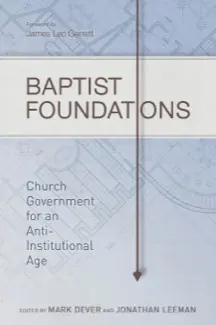

Baptist Foundations: Church Government for an Anti-Institutional Age
Pages
592
Publisher
B&H Academic
Published
6/15/2015
ISBN-13
9781433681042
Today is an anti-polity age, perhaps more than any other time in the history of the church. Yet polity remains as important now as it was in the New Testament church. Right polity strengthens Christians and their ties to one another. It is the platinum prongs that hold the diamond of the gospel in place, protecting the gospel from one generation to the next. Wrong polity, on the other hand, weakens Christians and their ties. It leaves heresies and hypocrites unchecked. It lets hurting sheep wander off and fall into canyons. It loosens the prongs so that the diamond of the gospel eventually falls to the ground and gets lost.
What then is a right or biblical polity? In this volume, representatives of several North American Baptist seminaries and a Baptist university make the exegetical and theological case for a Baptist polity. Right polity, they argue, is congregationalism, elder leadership, diaconal service, regenerate church membership, church discipline, and a Baptist approach to the ordinances.
Yet this book is not just for the seminary classroom. It is for the church leader. Each section explores the pastoral applications of these arguments. How do congregationalism and elder leadership work together? When should a church practice church discipline? How can one church work with another in matters of membership and discipline?
To be read sequentially or used as a reference guide, the contributions in Baptist Polity provide a contemporary treatment of Baptist church government and structures, the first of its kind in decades.
What then is a right or biblical polity? In this volume, representatives of several North American Baptist seminaries and a Baptist university make the exegetical and theological case for a Baptist polity. Right polity, they argue, is congregationalism, elder leadership, diaconal service, regenerate church membership, church discipline, and a Baptist approach to the ordinances.
Yet this book is not just for the seminary classroom. It is for the church leader. Each section explores the pastoral applications of these arguments. How do congregationalism and elder leadership work together? When should a church practice church discipline? How can one church work with another in matters of membership and discipline?
To be read sequentially or used as a reference guide, the contributions in Baptist Polity provide a contemporary treatment of Baptist church government and structures, the first of its kind in decades.